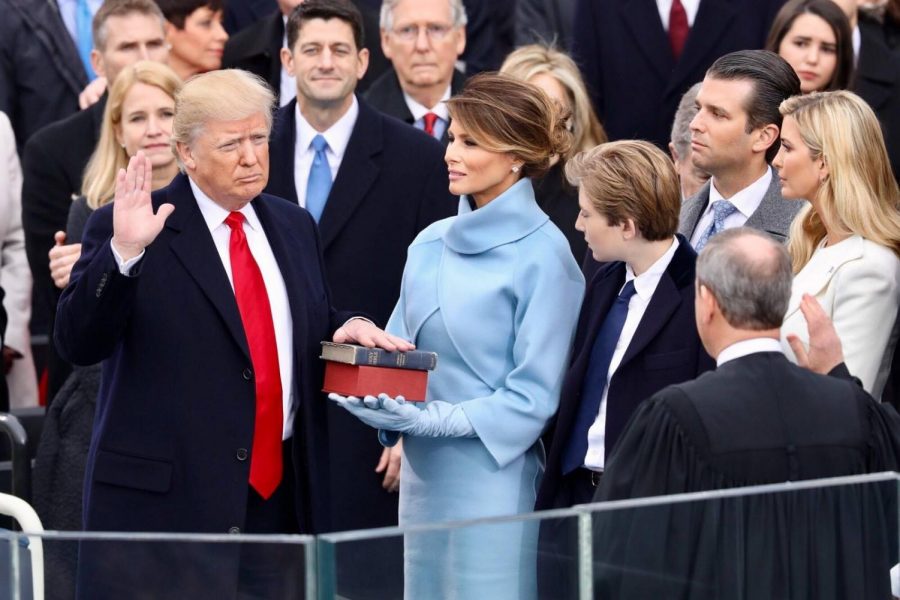Southern Lehigh Weighs in on Trump’s Impact on America One Year After His Inaguration
President Donald Trump being sworn in on January 20, 2017.
On January 20, 2017, Republican Donald Trump was inaugurated as the 45th President of the United States, taking the place of former Democratic President Barack Obama. Trump defeated the Democratic nominee Hillary Clinton in the electoral college, despite losing the popular vote. Now that the U.S. is about a year into this new presidency, what impact has Trump’s time in office had on the nation’s political climate thus far?
“[I was] wishing that there [would be] better candidates that could have made it through the primaries. I didn’t think that [Trump or Hillary] are great, [although] I feel that the right choice was made,” junior Riley Hefner said. “Although Trump isn’t great, I feel he’s better than [Hillary].”
Since his election campaign, Trump has voiced his plans to end several Obama-era programs that aid immigrants and their families, minorities, and lower income citizens. However, despite Congress making numerous attempts to repeal major legislation such as the Affordable Care Act, or Obamacare, there has not been enough bipartisan support to take any action, causing a deadlock on the issue.
Several other promises and topics of interest are now being revised or looked over. Major social issues such as LGBT rights as couples, women’s healthcare from services such as Planned Parenthood, and racism have been heavily discussed by the President, alongside plans and hopes to enact policies that will widely impact the nation for better or worse, such as Deferred Action for Childhood Arrivals (DACA) or Medicaid.
Trump has caused trouble in the past from his numerous comments and jabs at minority groups. In an Oval Office meeting last year, Trump questioned, “Why do we want people from Haiti here?”
Likewise, when prompted about Mexico, he reportedly said, “They’re sending people that have lots of problems, and they’re bringing those problems with us. They’re bringing drugs. They’re bringing crime. They’re rapists.”
Comments such as these have understandably caused controversy.
“Donald Trump’s remarks towards minorities and individual groups [have] aggravated me,” senior Aaron Focht said.
The President has also made headlines throughout his campaign and now into his presidency regarding discrimination and acts of hate. One of these most notable occasions occurred after the “Unite the Right” white supremacist rally in Charlottesville, Virginia. Trump made an attempt to comment publicly on the event, saying that there were good and bad people “on both sides.” Some were pleased with his response, stating he handled it well, as others note that the president should not refer to white supremacists as decent people.
Public relations with other countries have become increasingly tense since the election as well: the most controversial of which regarding the United States’ relations with North Korea.
The U.S. relationship with North Korea, specifically, has been intensified via Donald Trump’s twitter.
“North Korean Leader Kim Jong Un just stated that the ‘Nuclear Button is on his desk at all times.’ Will someone from his depleted and food starved regime please inform him that I too have a Nuclear Button, but it is a much bigger and more powerful one than his, and my button works,” Trump said on Twitter.
This growing strain on public relations with North Korea has been happening for decades, and was not borne out of Trump’s presidency. However, the tensions have increased enough for Trump to comment.
“If . . . forced to defend itself or its allies, we will have no choice but to totally destroy North Korea,” Trump said.
This idea of “destroying” North Korea is applauded by some, as well as sincerely feared by others.
“[The election is] going to impact everybody’s future whether it’s good or bad,” social studies teacher Mr. Tom Beaupre said. “The people elected are now our officials and we hope they are going to make good decisions for everyone in the country. We always hope for the best.”

Junior Erin Noneman is a first-year staff reporter for the Spotlight. She is also a member of the Feminist Student Union and the Literary Arts Club. She...


